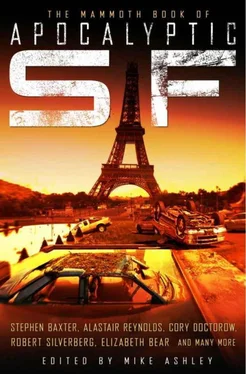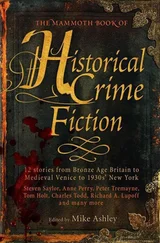This equable afternoon endured for thirty million years. The infant Pala’s parents had sung him songs unimaginably old.
But then had come the comet’s rude incursion. Nearly a hundred million years after the impactor that had terminated the summer of the dinosaurs, Earth had been due another mighty collision.
Pala and his parents, fortuitously close to a cave-ridden mountain, had endured the fires, the rain of molten rock, the long dust-shrouded winter. People survived, as they had lived through lesser cataclysms since the ice. And with their ingenuity and adaptability and generalist ability to eat almost anything, they had already begun to spread once more over the ruined lands.
Once it had been thought that human survival would depend on planting colonies on other worlds, for Earth would always be prone to such disasters. But people had never ventured far from Earth: there was nothing out there; the stars had always remained resolutely silent. And though since the ice their numbers had never been more than a few million, people were too numerous and too widespread to be eliminated even by a comet’s deadly kiss. It was easy to kill a lot of people. It was very hard to kill them all.
As it happened old Pala was the last human alive to remember the world before the Burning. With him died memories thirty million years deep. In the morning they staked out his body on a patch of high ground.
The hunting party returned to the river, to finish the job they had started. This time there was no last-minute reprieve for Urlu. She slit open her palm, and let her blood run into the murky river water. Its crimson was the brightest colour in the whole of this grey-black world.
Urlu’s virginal state made no difference to the silent creature who slid through the water, but she was drawn by the scent of blood.
Another of the planet’s great survivors, she had ridden out the Burning buried in deep mud, and fed without distaste on the scorched remains washed into her river. Now she swam up towards the murky light.
All her life Urlu had eaten nothing but snakes, cockroaches, scorpions, spiders, maggots, termites. That night she feasted on crocodile meat.
By the morning she was no longer a virgin. She didn’t enjoy it much, but at least it was her choice. And at least she wouldn’t have to go through any more blood-letting.
The catamaran glided towards the beach, driven by the gentle current of the shallow sea and the muscles of its crew. When it ran aground the people splashed into water that came up to their knees, and began to unload weapons and food. The sun hung bright and hot in a cloudless blue dome of a sky, and the people, small and lithe, were surrounded by shining clouds of droplets as they worked. Some of them had their favourite snakes wrapped around their necks.
Cale, sitting on the catamaran, clung to its seaweed trunks. Looking out to sea, he could see the fine dark line that was the floating community where he had been born. This was an age of warmth, of high seas which had flooded the edges of the continents, and most people on Earth made their living from the rich produce of coral reefs and other sun-drenched shallow-water ecosystems. Cale longed to go back to the rafts, but soon he must walk on dry land, for the first time in his life. He was eleven years old.
Cale’s mother, Lia, splashed through the water to him. Her teeth shone white in her dark face. “You will never be a man if you are so timid as this.” And she grabbed him, threw him over her shoulder, ran through the shallow water to the beach, and dumped him in the sand. “There!” she cried. “You are the first to set foot here, the first of all!”
Everybody laughed, and Cale, winded, resentful, blushed helplessly.
For some time Cale’s drifting family had been aware of the line on the horizon. They had prepared their gifts of sea fruit and carved coral, and rehearsed the songs they would sing, and carved their weapons, and here they were. They thought this was an island full of people. They were wrong. This was no island, but a continent.
Since the recovery of the world from Urlu’s great Burning, there had been time enough for the continents’ slow tectonic dance to play out. Africa had collided softly with Europe, Australia had kissed Asia, and Antarctica had come spinning up from the south pole. It was these great geographical changes — together with a slow, relentless heating-up of the sun — which had given the world its long summer.
While the rafts had dreamed over fecund seas, seventy million years had worn away. But even over such a tremendous interval people were much the same as they had always been.
And now here they were, on the shore of Antarctica — and Cale was indeed the first of all.
Unsteadily he got to his feet. For a moment the world seemed to tip and rock beneath him. But it was not the world that tipped, he understood, but his own imagination, shaped by a life on the rafts.
The beach stretched around him, sloping up to a line of tall vegetation. He had never seen anything like it. His fear and resentment quickly subsided, to be replaced by curiosity.
The landing party had forgotten him already. They were gathering driftwood for a fire and unloading coils of meat -snake meat, from the fat, stupid, domesticated descendants of one of the few animals to survive the firestorm of Urlu’s day. They would have a feast, and they would get drunk, and they would sleep; only tomorrow would they begin to explore.
Cale discovered he didn’t want to wait that long. He turned away from the sea, and walked up the shallow slope of the beach.
A line of hard trunks towered above his head, smooth-hulled. These “trees”, as his father had called them, were in fact a kind of grass, something like bamboo. Cale came from a world of endless flatness; to him these trees were mighty constructs indeed. And sunlight shone through the trees from an open area beyond.
A few paces away a freshwater stream decanted onto the beach and trickled to the sea. Cale could see that it came from a small gully that cut through the bank of trees. It was a way through, irresistible.
The broken stones of the gully’s bed stung his feet, and sharp branches scraped at his skin. The rocks stuck in the gully walls were a strange mix: big boulders set in a greyish clay, down to pebbles small enough to have fit in Cale’s hand, all jammed together. Even the bedrock was scratched and grooved, as if some immense, spiky fish had swum this way.
Here in this tropical rainforest, Cale was surrounded by the evidence of ice.
He soon reached the open area behind the trees. It was just a glade a few paces across, opened up by the fall of one mighty tree. Cale stepped fonvard, making for a patch of green. But iridescent wings beat, and a fat, segmented body soared up from the green, and Cale stumbled to a halt. The insect was huge, its body longer than he was tall. Now more vast dragonflies rose up, startled, huddling for protection. A sleeker form, its body yellow-banded, came buzzing out of the trees. It was a remote descendant of a wasp, a solitary predator. It assaulted the swarming dragonflies, ripping through shimmering wings. All this took place over Cale’s head in a cloud of flapping and buzzing. It was too strange to be frightening.
He was distracted by a strange squirming at his feet. The patch of green from which he had disturbed the first dragonfly was itself moving, flowing over the landscape as if liquid.
It was actually a crowd of creatures, a mass of wriggling worms. From the tops of tottering piles of small bodies, things like eyes blinked.
Such sights were unique to Antarctica. There was no other place like this, anywhere on Earth.
When its ice melted away, the bare ground of Antarctica became an arena for life. The first colonists had been blown on the wind from over the sea: vegetation, insects, birds. But this was not an age for birds, or indeed mammals. As the world’s systems compensated for the slow heating of the sun, carbon dioxide, the main greenhouse gas, was drawn down into the sea and the rocks, and the air became oxygen-rich. The insects used this heady fuel to grow huge, and predatory wasps and cockroaches as bold as rats made short work of Antarctica’s flightless birds.
Читать дальше












